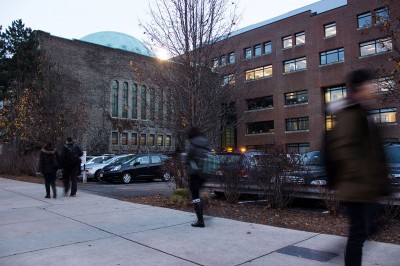
Gloria Waters, vice president and associate provost for research at Boston University, hosted a town hall meeting Thursday to discuss the Center for Integrated Life Sciences and Engineering building that is scheduled to break ground in May 2015 at 610 Commonwealth Ave.
Researchers at CILSE will focus on seven different areas: photonics, synthetic and systems biology, systems neuroscience, data science, global health, urban health and infectious disease, Waters said at the meeting.
“What we wanted to do is emphasize interdisciplinary research, where Boston University can really be uniquely excellent. Those are the areas that we’re really focusing on, and that’s part of the background behind this building,” she said. “We also want to focus on bringing together faculty from across the university, so that is faculty cross the two campuses.”
Approximately 50 BU faculty and administrators attended the town hall meeting held in the School of Management.
“We have decided as a university that one of the ways we’re going to do this [move research forward] is focus on research centers and institutes that span across different schools and colleges,” Waters said. “Centers and institutes are an excellent way to bring together people across different disciplines and facilitate interdisciplinary pursuits.”
Thirty percent of the space will be left unallocated to allow for future employment and research opportunities, Waters said. Through CILSE, BU hopes to address concerns of insufficient research space, a pertinent issue in its high quality faculty.
“One of the challenges for systems neuroscience and also for synthetic biology, and basically for our work in the life sciences, is that we really do have world-class faculty in a lot of these areas,” she said. “We have a great faculty, but we have substandard space that those faculty [members] have labs in.”
Some faculty members in attendance expressed concerns about CILSE’s location because it would limit the number of ground-level parking options on campus.
However, Paul Rinaldi, assistant vice president for space planning, said a recent study confirmed there would still be enough space on campus for parking, even after the removal of the parking lot which CILSE will be built on top of.
“As part of the institutional master plan, which was completed about two years ago, there was a full parking analysis. It was determined that there is capacity for us to lose the spaces that are there,” he said.
Rinaldi rejected the plausibility of the idea of including a parking garage similar to that of Warren Towers in CILSE because the garage could be an inconvenience to those who work and live there.
“Warren Towers has a single basement and three stories, and all the students, everybody who uses the building, traverses four floors on escalators to get to the community space,” he said. “For those who live in the building, it’s not really a successful solution.”
Rinaldi also confirmed the possibility that faculty may have to park across the BU Bridge in West Campus.
Jeremiah Seymour, a lab manager in the College of Arts and Sciences who specializes in the establishment and upkeep of large-scale marine systems, said he is concerned about the disruption that the building construction would cause to the neighboring environment.
“I’m here because I work in a biology lab at 5 Cummington [Mall],” he said. “We’re worried about residence and that nothing is going to happen to the fish tanks from falling debris from the ceiling, that the sensitive behavior research that we’re doing is not going to be disturbed [and] the fish tank’s not going to break.”
Lawrence Sulak, a professor of physics in CAS, said he was satisfied with the information the planning and development team shared at the town hall meeting to address any possible issues with CILSE’s construction.
“They’re clearly working out the problems that occur,” he said. “Anything like this requires compromise by lots of people. Since there will be space potentially lost to physics, we want to figure out how we can deal with it.”




